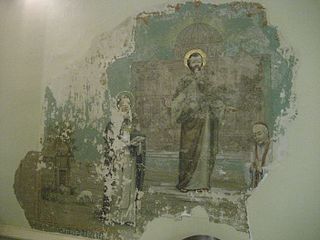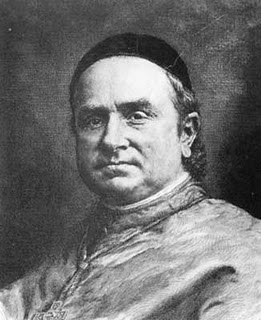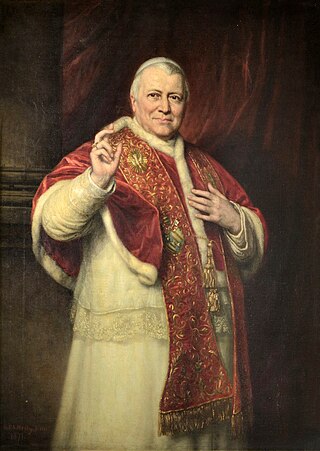
The First Ecumenical Council of the Vatican, commonly known as the First Vatican Council or Vatican I, was the 20th ecumenical council of the Catholic Church, held three centuries after the preceding Council of Trent which was adjourned in 1563. The council was convoked by Pope Pius IX on 29 June 1868, under the rising threat of the Kingdom of Italy encroaching on the Papal States. It opened on 8 December 1869 and was adjourned on 20 September 1870 after the Italian Capture of Rome. Its best-known decision is its definition of papal infallibility.

Ultramontanism is a clerical political conception within the Catholic Church that places strong emphasis on the prerogatives and powers of the Pope. It contrasts with Gallicanism, the belief that popular civil authority—often represented by the monarch's or state's authority—over the Church is comparable to that of the Pope.

The Holy See exercised political and secular influence, as distinguished from its spiritual and pastoral activity, while the pope ruled the Papal States in central Italy.
Infallibility refers to an inability to be wrong. It can be applied within a specific domain, or it can be used as a more general adjective. The term has significance in both epistemology and theology, and its meaning and significance in both fields is the subject of continued debate.

Johann Joseph Ignaz von Döllinger, also Doellinger in English, was a German theologian, Catholic priest and church historian who rejected the dogma of papal infallibility. Among his writings which proved controversial, his criticism of the papacy antagonized ultramontanes, yet his reverence for tradition annoyed the liberals.

Louis Veuillot was a French journalist and author who helped to popularize ultramontanism.
Gallicanism is the belief that popular secular authority—often represented by the monarch's or the state's authority—over the Catholic Church is comparable to that of the pope. Gallicanism is a rejection of ultramontanism; it has something in common with Anglicanism, but is nuanced, in that it plays down the authority of the Pope in church without denying that there are some authoritative elements to the office associated with being primus inter pares. Other terms for the same or similar doctrines include Erastianism, Febronianism, and Josephinism.

The magisterium of the Catholic Church is the church's authority or office to give authentic interpretation of the word of God, "whether in its written form or in the form of Tradition". According to the 1992 Catechism of the Catholic Church, the task of interpretation is vested uniquely in the Pope and the bishops, though the concept has a complex history of development. Scripture and Tradition "make up a single sacred deposit of the Word of God, which is entrusted to the Church", and the magisterium is not independent of this, since "all that it proposes for belief as being divinely revealed is derived from this single deposit of faith".
Conciliarism was a reform movement in the 14th-, 15th- and 16th-century Catholic Church which held that supreme authority in the Church resided with an ecumenical council, apart from, or even against, the pope.

Papal primacy, also known as the primacy of the bishop of Rome, is an ecclesiological doctrine in the Catholic Church concerning the respect and authority that is due to the pope from other bishops and their episcopal sees. While the doctrine is accepted at a fundamental level by both the Catholic Church and Eastern Orthodox Church, the two disagree on the nature of primacy.

Febronianism was a powerful movement within the Catholic Church in Germany, in the latter part of the 18th century, directed towards nationalising Catholicism, restricting the power of the papacy in favour of the episcopate, and reunion of dissident churches with the Catholic Church. Its thrust broadly corresponded to that of Gallicanism in France. Friedrich Lauchert describes Febronianism, in the Catholic Encyclopedia, as a politico-ecclesiastical system, ostensibly purposed to facilitate reconciliation of Protestant entities with the Catholic Church by curbing the Holy See's power.
The infallibility of the Church is the belief that the Holy Spirit preserves the Christian Church from errors that would contradict its essential doctrines. It is related to, but not the same as, indefectibility, that is, "she remains and will remain the Institution of Salvation, founded by Christ, until the end of the world." The doctrine of infallibility is premised on the authority Jesus granted to the apostles to "bind and loose" and in particular the promises to Peter in regard to papal infallibility.
Sedeprivationism is a doctrinal position within Traditionalist Catholicism which holds that the current occupant of the Holy See is a duly-elected pope, but lacks the authority and ability to teach or to govern unless he recants the changes brought by the Second Vatican Council. The doctrine asserts that since this council, occupants of the See of Peter are popes materialiter sed non formaliter, that is "materially but not formally". As such, sedeprivationists teach that Pope John XXIII, Pope Paul VI, Pope John Paul I, Pope John Paul II, Pope Benedict XVI, and Pope Francis have not attained fullness of the papacy.

Papal supremacy is the doctrine of the Catholic Church that the Pope, by reason of his office as Vicar of Christ, the visible source and foundation of the unity both of the bishops and of the whole company of the faithful, and as pastor of the entire Catholic Church, has full, supreme, and universal power over the whole church, a power which he can always exercise unhindered: that, in brief, "the Pope enjoys, by divine institution, supreme, full, immediate, and universal power in the care of souls."

Pastor aeternus was issued by the First Vatican Council, July 18, 1870. The document defines four doctrines of the Catholic faith: the apostolic primacy conferred on Peter, the perpetuity of the Petrine Primacy in the Roman pontiffs, the definition of the papal primacy as a papal supremacy, and Papal infallibility – infallible teaching authority (magisterium) of the Pope.

Louis-Édouard-François-Desiré Pie, also referred to as Cardinal Pie, was a French Catholic bishop of Poitiers and cardinal, known for his ultramontanism and defence of the social reign of Christ the King.
The history of the Catholic Church is the formation, events, and historical development of the Catholic Church through time.

The Catholic Church and the Eastern Orthodox Church have been in a state of official schism from one another since the East–West Schism of 1054. This schism was caused by historical and language differences, and the ensuing theological differences between the Western and Eastern churches.
The historical roots of Papal primacy can be traced back to the early centuries of Christianity, wherein the bishop of Rome, commonly referred to as the Pope, gradually accrued increasing authority and recognition. A confluence of historical, theological, and political factors contributed to this development.

Papal infallibility is a dogma of the Catholic Church which states that, in virtue of the promise of Jesus to Peter, the Pope when he speaks ex cathedra is preserved from the possibility of error on doctrine "initially given to the apostolic Church and handed down in Scripture and tradition". It does not mean that the pope cannot sin or otherwise err in some capacity, though he is prevented by the assistance of the Holy Spirit from issuing heretical teaching even in his non-infallible Magisterium, as a corollary of indefectibility. This doctrine, defined dogmatically at the First Vatican Council of 1869–1870 in the document Pastor aeternus, is claimed to have existed in medieval theology and to have been the majority opinion at the time of the Counter-Reformation.












